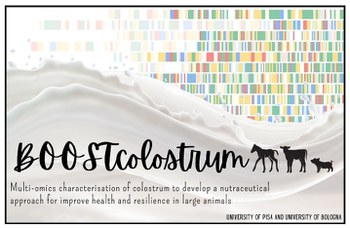BOOSTcolostrum
Multi-omics characterisation of colostrum to develop a nutraceutical approach for improve health and resilience in large animals


Coordinator: Università di Pisa, Dipartimento di Medicina Veterinaria
Scientific Officer: Diana Luise
Duration: 30/11/2023 - 30/10/2025
Research group: Diana Luise, Paolo Trevisi, Federico Correa, Maurizio Mazzoni.
Colostrum may represent a nutraceutical intervention for livestock species but to date little is still known regarding its use in these species. The overall aim of the project will be to drive the investigation at a multi-omics approach, leading to a proficient use of colostrum as nutraceutical for diseases prevention.
The project will be organised as a prospective cohort study involving two research units (RUs) (University of Pisa and University of Bologna) and composed by 4 Work Packages (WPs).
The WP1 will be about the overall organisation, analysis reports and disseminations of the results. The WP2 will aim to characterise the bovine, equine and swine colostrum using a multi-omics approach comparing results with health and performance parameters. Colostrum from cows and mares (n=24 each) and blood samples from their newborn will be
collected at birth (T0), at 6 (T6), 12 (T12), 24 (T24) and 72 (T72) hours of life. Both samples will be assessed for immu-noglobulins G (IgG) concentrations, and they will be characterised with metabolomic untargeted and lipidomic. Health and performance parameters will be recorded, and the results will be related. Five commercially artificial colostrum for piglets will be analysed using the same multi-omics approach. The obtained result will be used to compare the compo-sition of the artificial colostrum with swine colostrum (n=20). Piglets will be classified as low birth body weight (BW) and normal birth BW. Health, diarrhoea, use of antibiotics and mortality will be recorded, also, at day 6 and at day 28, a faecal sample from 6 piglets/sow will be collected and microbial data will be used to cluster piglets for their gut health. Parameters will be related. The WP3 will aim to evaluate with a multi-omics approach the use of different colostrum supplements on the health, and growth of calves and foals; and to test a commercial and a new colostral formulation on the health, robustness, maturation and growth of low and normal birth body weight piglets. Since the 4 days of life, calves and foals will be feed with maternal milk plus and extra meal made by warm water (placebo), 70 g and 150 g of IgG by colostrum replacer. Health parameters will be evaluated, including signs of diseases until the 60th day of life. Blood and colostrum samples collected at 7 (T7d), 21 (T21d) and 60 (T60d) days of life will be evaluated as in WP2. The WP4 will aim to have a suitable, proper utilisation and integrated use of all omics data generated in the WP2 and WP3 to achieve the specific objectives of each task.
Expected results will be to evaluate the interaction between health, immunological and multi-omics parameters during the first weeks of life in calves, foals and piglets and to verify the nutraceutical effect of colostrum on calves, foals and piglets’ health and performance. Overall, the nutraceutical use of colostrum is expected to improve health and reduce antibiotic treatments in young animals.
Funding
Funded by the European Union - NextGenerationEU under the National Recovery and Resilience Plan (PNRR) - Mission 4 Education and research - Component 2 From research to business - Investment 1.1 Notice PRIN 2022 PNRR (DD N. 1409 del 14/09/2022), from title "Multi-omics characterisation of colostrum to develop a nutraceutical approach for improve health and resilience in large animals", proposal code P2022ZTYLS - CUP J53D23018670001.